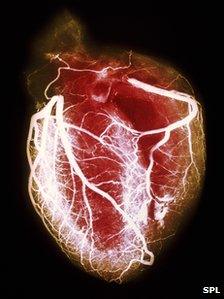Dundee researchers develop tests for early heart disease
- Published

Researchers hope the tests can confirm heart disease before symptoms develop
Scientists at Dundee University believe a combination of blood tests could help detect heart disease earlier.
The blood tests cost around £25 per patient, and are currently used to confirm the disease in patients with obvious symptoms.
Researchers found that certain tests could help detect the disease before symptoms develop.
Up to 50% of people who have a sudden cardiac death die without being diagnosed with heart disease.
Scientists said that in the early stages of heart disease, there is low-level damage to the heart but no symptoms.
Key molecules
It is hoped that if people with low-level heart damage were identified before they developed symptoms, they could be given treatments to prevent future events such as a heart attack or sudden cardiac death
The researchers looked at 300 people with high blood pressure or cholesterol and tested their blood for two molecules released by the heart when damaged or under stress, called high sensitivity troponin and B-type natriuretic peptide.
Both tests are currently used in the diagnosis of more obvious, developed heart disease.
Of the 300 participants in the study, 102 turned out to have silent heart disease.
The researchers confirmed that patients with positive blood tests actually had silent heart disease by carrying out heart scans in all 300 patients.
The next step for the Dundee researchers is to calculate which patients could benefit most from the tests.
Professor Allan Struthers, head of cardiovascular and diabetes medicine at the university, who led the study, said: "Many people think of heart disease as something that happens suddenly, but the truth is that it often develops over years, or even decades.
"Yet despite being the UK's single biggest killer, the first sign someone has heart disease is often severe chest pain or sudden death".
Important step
He said they hoped it could one day lead to screening for presymptomatic heart disease.
Professor Peter Weissberg, Medical Director at the British Heart Foundation, which funded the study, said: "The study shows that a blood test, coupled with a simple heart scan, may be able to identify these early signs of heart disease.
"The next steps will be to confirm how reliable the tests are, and show that early treatment of people who test positive can improve their outlook.
"This research is an important step in the right direction."
- Published7 August 2012
- Published14 May 2012
- Published14 February 2011
- Published7 September 2010